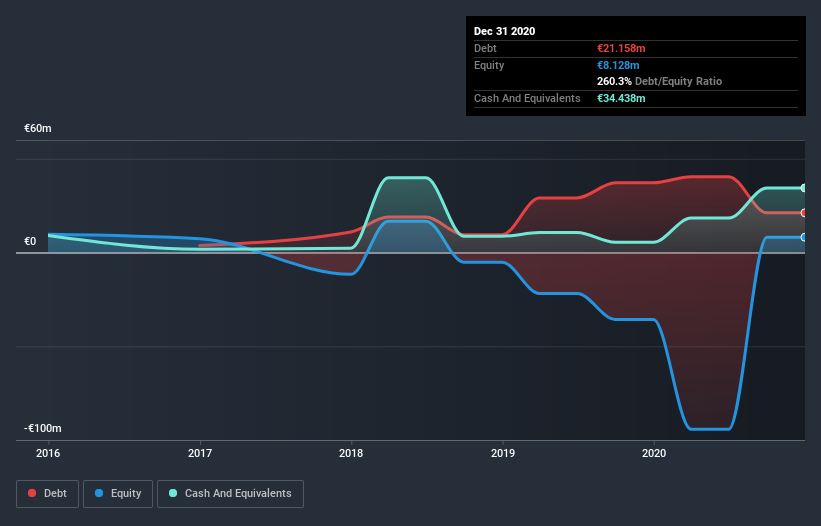Health Check: How Prudently Does Marley Spoon (ASX:MMM) Use Debt?
Some say volatility, rather than debt, is the best way to think about risk as an investor, but Warren Buffett famously said that 'Volatility is far from synonymous with risk.' So it seems the smart money knows that debt - which is usually involved in bankruptcies - is a very important factor, when you assess how risky a company is. We note that Marley Spoon AG (ASX:MMM) does have debt on its balance sheet. But the real question is whether this debt is making the company risky.
Why Does Debt Bring Risk?
Debt and other liabilities become risky for a business when it cannot easily fulfill those obligations, either with free cash flow or by raising capital at an attractive price. Part and parcel of capitalism is the process of 'creative destruction' where failed businesses are mercilessly liquidated by their bankers. However, a more common (but still painful) scenario is that it has to raise new equity capital at a low price, thus permanently diluting shareholders. Of course, the upside of debt is that it often represents cheap capital, especially when it replaces dilution in a company with the ability to reinvest at high rates of return. The first thing to do when considering how much debt a business uses is to look at its cash and debt together.
View our latest analysis for Marley Spoon
What Is Marley Spoon's Debt?
The image below, which you can click on for greater detail, shows that Marley Spoon had debt of €21.2m at the end of December 2020, a reduction from €37.1m over a year. However, its balance sheet shows it holds €34.4m in cash, so it actually has €13.3m net cash.
How Healthy Is Marley Spoon's Balance Sheet?
According to the last reported balance sheet, Marley Spoon had liabilities of €37.0m due within 12 months, and liabilities of €27.9m due beyond 12 months. Offsetting this, it had €34.4m in cash and €697.0k in receivables that were due within 12 months. So its liabilities total €29.8m more than the combination of its cash and short-term receivables.
Given Marley Spoon has a market capitalization of €448.3m, it's hard to believe these liabilities pose much threat. But there are sufficient liabilities that we would certainly recommend shareholders continue to monitor the balance sheet, going forward. Despite its noteworthy liabilities, Marley Spoon boasts net cash, so it's fair to say it does not have a heavy debt load! The balance sheet is clearly the area to focus on when you are analysing debt. But it is future earnings, more than anything, that will determine Marley Spoon's ability to maintain a healthy balance sheet going forward. So if you're focused on the future you can check out this free report showing analyst profit forecasts.
In the last year Marley Spoon wasn't profitable at an EBIT level, but managed to grow its revenue by 96%, to €254m. With any luck the company will be able to grow its way to profitability.
So How Risky Is Marley Spoon?
Statistically speaking companies that lose money are riskier than those that make money. And the fact is that over the last twelve months Marley Spoon lost money at the earnings before interest and tax (EBIT) line. And over the same period it saw negative free cash outflow of €4.2m and booked a €86m accounting loss. Given it only has net cash of €13.3m, the company may need to raise more capital if it doesn't reach break-even soon. With very solid revenue growth in the last year, Marley Spoon may be on a path to profitability. By investing before those profits, shareholders take on more risk in the hope of bigger rewards. There's no doubt that we learn most about debt from the balance sheet. However, not all investment risk resides within the balance sheet - far from it. Case in point: We've spotted 1 warning sign for Marley Spoon you should be aware of.
If, after all that, you're more interested in a fast growing company with a rock-solid balance sheet, then check out our list of net cash growth stocks without delay.
This article by Simply Wall St is general in nature. It does not constitute a recommendation to buy or sell any stock, and does not take account of your objectives, or your financial situation. We aim to bring you long-term focused analysis driven by fundamental data. Note that our analysis may not factor in the latest price-sensitive company announcements or qualitative material. Simply Wall St has no position in any stocks mentioned.
Have feedback on this article? Concerned about the content? Get in touch with us directly. Alternatively, email editorial-team (at) simplywallst.com.

